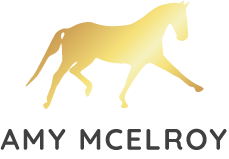Dear Amy,
I was recently at a recognized dressage show as a spectator before I attempt competing. I
was curious about some of my observations. I was wondering if you could explain some
things to me.
First: Everyone seemed to have a different way to get to the exit at A. Some people just
turned around and left, some approached and thanked the judge, and some even added a
circle before the exit. Is there an appropriate way to leave the arena when your test is
completed?
Second, Is it common for judges to call you and talk to you at the end of the test? The
judge called several riders to the booth at the completion of their test and reprimanded
them about using their voice. What are the consequences of using your voice?
Dear First-Timer,
What a great idea to spectate and observe how a recognized show will be run. This will
give you some insight on what to expect when you are ready to compete.
In answer to your first question, I agree. As a judge I do see riders leaving the arena after
their salute in many different ways. There actually is no real rule for leaving the arena
other than the way stated on every dressage test: After the final salute, leave the arena at
A in a free walk.
According to the USEF rulebook DR122.78, a test begins with the entry at A and ends
after the final salute. Everything before the beginning or after the end of a test has no
effect on the marks.
So, after your final salute, your test is officially over. There is no time limit for leaving
the arena. There is no correct way to turn – you may turn left or right at your discretion.
However, a polite way to leave is to take a few walking steps forward toward your judge
at C. It is then appropriate to thank your and even to smile before turning back onto the
long side and exiting at A at the free walk.
People sometimes do make a circle before leaving the arena, presumably for schooling
purposes. Judges are usually not appreciative of this. Remember, once you do salute, the
next rider will be awaiting their turn to enter. It is courteous to leave the arena promptly
to help keep the show running on time. Stay focused and purposeful until you are out of
the dressage arena. Once you are out, you may wave to and acknowledge any friends or
spectators who are interested in your ride. Do remember that the judge can hear what you
are saying at this time, as they will be finalizing their comments and scores.
As for your question about the voice and the judge calling riders to the booth, the judge
has the right to call any competitor to their booth to talk to them, for any legitimate
reason. You do not see this often, but it does happen. The judge is generally not
reprimanding riders, but pointing out reasons they may have some deductions on their
test, and trying to help them do better next time.
In this case the judge was clearly making a point about deductions on the test for the use
of voice. According to USEF DR 122.3. the use of voice, clicking the tongue once or
repeatedly, is a serious fault involving deductions of at least two marks from the
movement in which it occurs. In cases where the movement has a coefficient, judges may
choose to deduct only one mark off the movement.
If your judge hears you using your voice in any way, they may cross the number awarded
for the movement out, and then write “minus 2, voice” and put in the new number. For
instance, if you would have had a 7 on your trot lengthening but judge hears you cluck,
they might cross out the 7, make it a 5, and write the word “voice” in the scoring box. A
voice deduction is not considered an error. There is no limit to how many deductions can
be taken for voice. However, there can only be one deduction per scoring box.
Remember, voice can be any talking or sounds used to influence your horse’s way of
going. Be very careful about using your voice – riders sometimes do not even realize that
they are doing it, especially those who have a habit of talking to and clucking to their
horses in their regular schooling.
I hope this helps you be confident on how to exit the arena and not to be worried about
the judge calling you over after your test – this does not happen very often, but when it
does it is to help you. Good luck at your first show.

